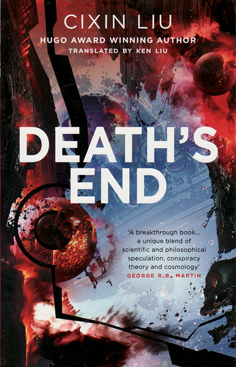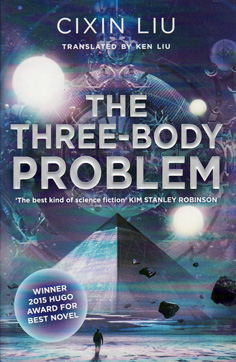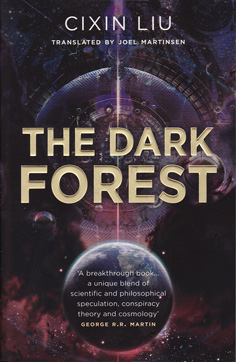This third book in Cixin Liu’s series eclipses the previous two. By the end of the second book, 黑暗森林 (The Dark Forest), Luo Ji has achieved a workable deterrent against the Trisolaran invasion. The climax is exciting, the ending realistic, given the Liu’s universe, and the novel is deeply satisfying. I wondered when I finished it what could justify a third novel, larger than either of the first two. Merely reversing humanity’s status quo with the Trisolarans to affect a return of their invasion fleets would have smacked of the worst of Hollywood, intent on rehashing an old plot for another Summer block buster. And as I began to read I was concerned that this was exactly what was beginning to happen. But Liu’s narrative makes the return of the Trisolarans seem almost irrelevant; a mere stepping stone to a larger theme; something he evidently envisaged when he started these books.
Each of the novels features a protagonist who is key to humanity’s fate. In 三体 (The Three-Body Problem) Ye Wenjie instigates the Trisolaran crisis when she uses the sun as an amplifier to reveal Earth’s presence to any who might be listening in outer space. In The Dark Forest, Luo Ji is tasked as a Wallfacer with finding a means to defeat the Trisolarans. However, his solution is not a complete victory, requiring a constant threat of mutual destruction in the years after the crisis in order to keep the Trisolarans at bay, much like the deterrent nuclear weapons have played after World War II. In this third book Cheng Xin assumes the role of the second Swordholder – the person given the responsibility of maintaining the peace with the Trisolarans through the threat of mutual destruction – from Luo Ji, himself, now an old man.
However, the scale of the novel is well beyond the concerns of the Trisolaran invasion. A hint of this can be found in the time line at the beginning of the novel, starting with the Common Era, our own period of history, and projecting millions of years into the future. 死神永生 (Death’s End) has found a new subject in a grand existential saga of survival and a search for meaning.
The novel begins, bizarrely, with an account of the siege and fall of Constantinople in 1453. Constantinople had survived as the eastern arm of the Roman empire for ten centuries after the fall of Rome. In all human history, the Roman empire has probably been one of the most influential and provided humanity with one of the most graspable ideas of eternity:
The historical significance of the fall of Constantinople would not be apparent for many years. For most, the obvious association was that it marked the final grasp of the Roman Empire. Byzantium was a thousand-year rut behind the wheels of Ancient Rome, and though it enjoyed splendour for a time, it finally evaporated like a water stain under the bright sun. Once, ancient Romans had whistled in their grand, magnificent baths, thinking that their empire, like the granite that made up the walls in the pools in which they floated, would last forever.
Naturally, the presumptions of the Roman Empire are relevant to our own civilisation and to every individual. The very title of the novel, ‘Death’s End’, evokes that hubristic belief that each civilisation along with each individual in those civilisations will somehow evade their own death, whether it be through denial, religion or a hope in science. The major characters of the novel face their own mortality throughout the long centuries of the story. Tianming, for instance, is a young man in love with Cheng Xin from afar, like a latter-day Petrarch, who, faced with a terminal disease, is willing to end his own life with the aid of new euthanasia laws. But even in this simple decision Tianming discovers that he has been manipulated by his government so that he might accept a radical role in the Staircase Program, a strategy running concurrently with the Wallfacer program of the second novel, which requires that Tianming’s brain be sent to the Trisolarans in a daring and desperate bid to place a spy with the enemy. There is also the philosophical problem that is raised by the end of death, itself:
As modern biology advanced apace, people began to believe that death’s end would be achievable in one or two more centuries. If so, those who chose hibernation were taking the first steps on the staircase to life everlasting. For the first time in history, Death itself was no longer fair. The consequences were unimaginable. (73)
Cheng Xin enters states of hibernation throughout the course of the story, always to be re-awoken at crucial moments, thereby maintaining her youth through the centuries covered by the narrative, and providing the reader with a unique perspective of the problem raised by the novel’s opening: No banquet was eternal. Everything had an end. Everything.
And the problem isn’t of the practical and moral concerns that plague society with the so-called introduction of Death’s end through hibernation – issues or fairness, for instance: regarding wealth, regarding opportunity, regarding who benefits from the labours and advances of those who live and die while others hibernate – but other questions of one’s purpose and of the problematic presumption that the future will always be better; of the hubristic assumption that one exists outside history and creation itself, that one’s civilisation is eternal, and that the self and the achievements of civilisation are something beyond the physical limits of decay. The large timescale of this novel is essential to demonstrate the folly of these propositions.
So, the idea of hibernation, whether it be technically feasible or not in reality, is an essential plot device to propel Cheng Xin and others throughout the centuries, with their assumptions of grand designs. At times, it creates weak points in the narrative. Each time Cheng Xin awakes she faces new advances in human technology, changes to human civilisation and needs to be updated on the state of the human race’s efforts to survive in the dangerous dark forest of the universe, revealed to be filled with potential aggressors. All this must be explained to Cheng Xin and the reader, necessitating long sections of exposition. It’s usually done well and Liu’s world building (or universe building) is informed by a rich understanding of current scientific theory and a strong imagination. But I felt, at times, that this reduced the momentous drive the novel needed. Nevertheless, Liu uses each leap through time that Cheng Xin achieves through hibernation to advance his plot and consider the ultimate problem raised by the Constantinople prologue: everything ends.
The problem with reviewing a book like this isn’t just that the narrative and ending shouldn’t be given away. That concern makes it harder to speak about, naturally. But it’s also that there are so many ideas in this novel and so many great moments. What is the fate of humanity? Should it hide or strike out into the stars or colonise its own system? How is our concept of humanity changed by these advances? Do the selfish needs of the individual merely play out on a cosmic scale or is the ultimate fate of all intelligent beings … to become as grand as their thoughts
? Can one person really make a difference or are we all mere things swept along in the vast play of the universe. Cixin Liu’s narrative raises so many questions and entertains in so many ways that to quibble over its minor faults or to question the need for a third novel seem entirely irrelevant. This is a book written on a scale and with a daring I don’t think I’ve ever seen in any other science fiction: not in Asimov’s Foundation series, not in Kim Stanley Robinson’s Utopian meditations or Miller’s A Canticle for Leibowitz, which attempts a grand cosmic timescale. I’m not a big reader of science fiction, but it is hard for me to imagine another series of books that achieve what Cixin Liu has achieved. Like all things, these books will be lost to the centuries to come, to the eventual dying of our star and the potential end of our universe, but I’m sure they will be read for many years as classics of science fiction before that ever happens.

 RSS Feed
RSS Feed Facebook
Facebook Instagram
Instagram YouTube
YouTube Subscribe to our Newsletter
Subscribe to our Newsletter





No one has commented yet. Be the first!